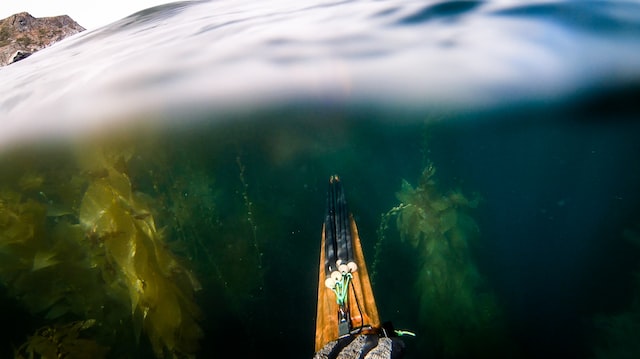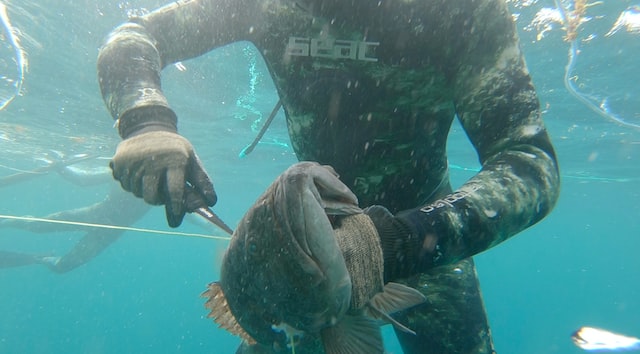In the United States, the laws governing spearfishing vary by state. In some states, such as California, spearfishing is legal and regulated by the state’s Department of Fish and Wildlife. In other states, such as Texas, spearfishing is legal but may be subject to certain restrictions, such as seasonal closures or size limits on the fish that can be taken. Spearfishing is illegal in some states, such as Michigan, unless done for scientific or educational purposes.
It is important to check the laws in your specific state before engaging in spearfishing, as there may be specific regulations in place that you need to follow. You should also make sure to obtain any necessary licenses or permits before spearfishing.
Difficulty of Spearfishing
Spearfishing can be as straightforward or as difficult as you make it. If you are just starting out and have no prior experience, it can be challenging to learn the proper techniques and to become proficient at spotting and stalking fish. However, with practice and patience, it can become easier. Some factors that can affect the difficulty of spearfishing include the species of fish you are targeting, the type of equipment you are using, and the environment in which you are diving. It is also important to have good physical fitness and comfort in the water, as well as a good understanding of marine life and safe diving practices.
What is the best way to learn to spearfish?
There are several ways to learn how to spearfish, including the following:
- Take a spearfishing course: Many dive centers and spearfishing clubs offer courses that teach the basics of spearfishing, including safety, techniques, and equipment use. These courses are a good way to learn the fundamentals of spearfishing and get started in the sport.
- Learn from an experienced spearfisher: If you know someone who is experienced in spearfishing, they may be able to teach you the basics and provide guidance as you get started.
- Read books and online resources: There are many books and online resources that provide information on spearfishing techniques and safety. These can be a good way to learn about the sport and get some basic knowledge before you start.
- Practice: As with any skill, practice is key to becoming proficient at spearfishing. The more you go out and spearfish, the more you will learn and improve your skills.
Spearfishing can be a dangerous sport, particularly for those who are inexperienced. It is crucial to prioritize safety and to follow all relevant laws and regulations when spearfishing. It is also a good idea to get proper training and supervision when starting out in the sport.
Spearfishing Attracts Sharks?
It is possible that spearfishing may attract sharks, as it involves catching and potentially bleeding fish, which can attract predatory animals. Sharks have a highly developed sense of smell and can detect small amounts of blood in the water from a long distance away. In addition, the movement of a spearfisherman or the sound of a speargun firing can also potentially attract sharks. It is important for spearfishermen to be aware of their surroundings and the potential presence of sharks while they are in the water. If you see a shark while spearfishing, it is best to slowly and calmly exit the water.
What to do if you see a shark while spear fishing?
If you see a shark while spearfishing, it is important to remain calm and try to slowly and carefully back away from the shark. Do not try to spear the shark, as this could provoke it and lead to an attack. Sharks are generally more interested in smaller prey, so try to make yourself look as large as possible by holding your speargun or other gear above your head or by standing tall and waving your arms. If the shark continues to approach or shows aggressive behavior, try to make a loud noise by banging your speargun or other equipment on the water or on the bottom of the ocean to try to scare it away. If the shark does attack, use your speargun or any other available weapons to try to fend it off. It is also a good idea to have a plan in place for what to do if you encounter a shark while spearfishing, such as having a signaling device or a buddy system in place to alert others if you need help.
Spearfishermen Dive Depths
When hunting for fish, spearfishers may dive to depths of several tens of meters. The depth at which a spear fisherman can dive depends on various factors, including the diver’s training and experience, the type of diving equipment being used, and the diver’s physical condition and ability to hold their breath. Some experienced spearfishermen are able to dive to depths of over 30 meters, while others may be limited to shallower depths due to medical conditions or other factors. It is important for spearfishermen to be aware of their limits and to dive safely at all times.
Do you need training to Spearfish?
While it is not legally required to have formal training in order to spearfish, it is highly recommended for safety reasons. Spearfishing can be a dangerous sport, particularly for those who are inexperienced. It is important to learn about the proper techniques and safety measures to ensure that you can enjoy the sport safely.
Taking a spearfishing course or learning from an experienced spearfisher can provide valuable knowledge and skills that will help you to safely participate in the sport. These courses and lessons can cover topics such as safety protocols, equipment use, and proper techniques for catching fish.
In addition to the safety benefits, having proper training can also help you to be more successful at spearfishing. Learning from an experienced spearfisher can give you valuable insights into the best techniques and strategies for catching fish, and can help you to become more proficient at the sport.

Overall, while it is not legally required to have formal training in order to spearfish, it is highly recommended in order to ensure safety and improve your chances of success.
Why do spear fishermen aim at the tail?
Spear fishermen typically aim for the tail of their target fish because the tail is the largest and strongest part of the fish’s body, making it easier to hit and ensuring a quick and humane kill. In addition, aiming for the tail allows the fisherman to avoid hitting the fish’s head or vital organs, which can damage the fish and make it inedible. By aiming for the tail, the fisherman can maximize the chances of a successful catch while also minimizing the chances of damaging the fish.
How much weight do I need to Spearfish?
The weight you need to spearfish depends on a number of factors, including your size, strength, and diving ability. In general, you should use a weight that allows you to comfortably and safely dive to the depths where you are fishing.
If you are just starting out, you may want to begin with a relatively lightweight, such as a 5-10 pound lead weight belt. This will allow you to focus on your technique and get a feel for diving and spearing. As you gain experience and confidence, you can gradually increase your weight to help you reach deeper depths and catch larger fish.
Using too much weight can be dangerous, as it can make it difficult to control your descent and ascent when diving. It’s always a good idea to start out with a smaller weight and gradually increase it as you become more comfortable and confident in the water. It’s also a good idea to consult with a diving instructor or experienced spearfisherman for guidance on how much weight to use.
Is it possible to make a living from spearfishing?
It is possible to make a living from spearfishing, but it is not typically a common way to earn a living. Spearfishing can be a lucrative activity for those who are skilled at it and are able to consistently catch a large volume of fish, but it is not a reliable source of income for most people. In order to make a living from spearfishing, you would need to be able to find a steady supply of fish to catch, have the necessary equipment and skills to catch them efficiently and be able to sell your catch at a high enough price to make it a viable source of income. Additionally, you would need to be able to do this consistently over a long period of time in order to make a living from it.
Thank you for reading, check out spearfishing rules here.
